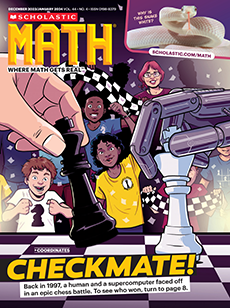Candace Fleming loves telling stories—especially true ones! She’s written more than 40 books for kids. Many of them are about historical events and people. Her latest book, The Enigma Girls, is no exception. (The Enigma Girls was published by Scholastic, which also publishes Scholastic MATH.) It tells the story of 10 teen girls who were code breakers during World War II. They worked at a top-secret estate north of London called Bletchley Park. Scholastic MATH spoke with Fleming about her research and writing process.
Writing The Enigma Girls
Meet author Candace Fleming and find out how she brought this true story to life!
Scholastic: The code-breaking effort of World War II was one of the biggest secrets of the entire war. How did you become interested in it?
Candace Fleming: I took a trip to Bletchley Park because I was in London. And they had a big graphic on the wall in their main building. It was a part of their museum where they talked about personnel.
What surprised you when you visited Bletchley Park?
I always thought Bletchley Park was about people like Alan Turing [a mathematician and cryptographer who helped crack the Enigma] and Tommy Flowers [an engineer who invented the Colossus code-breaking machine], those big famous scientist and mathematician names that we all know.
What I didn’t realize was that there were at least 9,000 people working at Bletchley Park by 1945, and the majority of them were young women between the ages of 14 and 19. I was like, “What? Teenagers? Teenagers really did this?” They were kids changing the course of history without even realizing it and not even being able to talk about it. I wanted to know about some individuals, how they felt, what they did. I went in search of those stories and I found so many. It was hard to pair it down to 10!
How did you learn more about the girls who worked at Bletchley Park?
So much of it was the most secret that it could be kept. Everybody signed the document that said you’re not allowed to talk about it with anybody. It was almost the 1970s before somebody actually broke the Official Secrets Act. It was one of the heads of Bletchley Park. And then everybody sort of went, “Wait, we can talk now!” And they began telling their stories.
The folks at Bletchley Park went out of their way to find the former employees—who were senior citizens by now. They took affidavits [a written document that the writer swears is true], they tape-recorded the women’s stories, they got copies of diaries and photographs. Because of them, I had quite an archive that I could mine.
Once I figured out the different jobs that needed to be done to break a cipher, I searched for a young woman from each one of those tasks. And then I wanted them from different time periods, because Bletchley Park stretched from 1939 to 1945. I wanted a young woman from each one of those times, and ones from different socio-economic backgrounds as well.
What is your writing process like once you’ve decided on a topic like the girls who worked at Bletchley Park?
Oh, it's a mess. I have no idea what I'm going to write! That sounds goofy. I know the topic and I know that I am searching for stories. For me, research is a really organic thing. You ask the questions that you want to know the answers to. And then I take notes about everything, because I still am unsure what matters most about this topic. That’s what I'm trying to figure out as I do research: Why do I want to tell young people about this? What do I have to say to them with this piece of history? Once I know the story, forwards and backwards, it begins to tell me how it needs to be told.
What was the most challenging part of telling their story?
I had to explain the difference between a code and a cipher and what the girls were looking for to help break those ciphers. That was, for me, the most challenging part. I turned to experts and mathematicians. I ended up learning a lot of things I never knew before, which is part of the reason I like writing nonfiction.
Why do you think it’s important to learn about history like this?
It’s about context. These aren’t just facts. These aren’t just things that happened, and these aren’t just dates and events that kids should memorize. History really is about human beings and the choices that they made. I would love if while people read my book they thought about their own selves. What if they were those girls? What would they do? I’d like them to put their own selves in those shoes a little bit.
